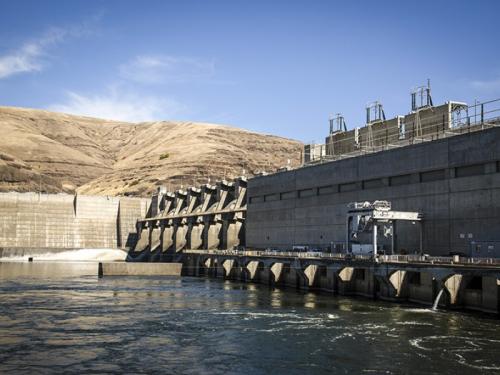Alarming "Salmon Extinction ACT" Passes In U.S. House
HR 3144 would circumvent the courts and undermine critical protections for endangered wild salmon
A small group led by Republicans in Congress spearheaded a bill that passed in the U.S. House of Representatives on Wednesday, April 25. If the bill becomes law, it could lead to the eventual extinction of wild salmon in the Columbia and Snake rivers — iconic species in the Pacific Northwest that the federal government is required by law to protect.

The Lower Granite Dam is one of the four Lower Snake River dams Earthjustice is fighting to remove.
House Resolution 3144 seeks to overturn multiple federal court decisions that protect endangered salmon and steelhead. It undermines bedrock environmental laws and forbids any action that might reduce power generation at Columbia and Snake River dams without an act of Congress — from spilling more water over dams in the spring to help endangered fish migrate, to studying the possibility of removing the four aging lower Snake River dams.
Further, it mandates that salmon populations be managed based on a 2014 federal plan that was rejected in two court decisions as being illegal, for not doing enough to save the fish from extinction.
“As a member of the Nez Perce Tribe, I oppose HR 3144,” said Julian Matthews, a board member of Nimiipuu Protecting the Environment, a nonprofit organization made up of members of the Nez Perce Tribe. “It will continue the march toward extinction for Snake River salmon that are so necessary to our life and culture.”
“HR 3144 is a giant step backwards in our region’s effort to restore salmon populations,” said Todd True, an Earthjustice attorney who has been at the forefront of this issue for more than two decades. “The entire goal of the bill is to circumvent the law and the courts, because a few legislators want to put a narrow set of economic interests ahead of the broad support in our region for salmon restoration. They have inserted themselves into the process, without considering the true consequences – for the fish, our energy future, or the Northwest economy.”
Rick Williams, a longtime independent conservation biologist and research associate at the College of Idaho, also described the bill as a “step backward,” for forestalling any progress on a scientifically sound salmon management plan and attempting to restrict spill. “Studies are very clear that spill (up to the nitrogen gas saturation level) gets juvenile fish past hydro projects with decreased mortality and gets them to the estuary more quickly, in a timeframe that mimics their historical migration time,” Williams explained. “This means higher survival rates and greater returns.”
“The whole bill is based on false choices — on the premise that we have to choose between dams or salmon, when there are robust, affordable energy choices and we can have both,” said Liz Hamilton, executive director, Northwest Sportfishing Industry Association. “And by requiring that ‘Congress shall act’ — which is almost an oxymoron these days — before we do anything for salmon, it also ensures continued gridlock instead of a real effort to find solutions for salmon and people.”
Glen Spain, Northwest regional director of the Pacific Coast Federation of Fishermen's Associations, a coast-wide trade association for commercial salmon-fishing families, called the legislation “a remarkably stupid idea.” He added: “Moving backwards by ignoring science and mandating bad public policy based mostly on wishful thinking will set back Columbia River salmon restoration efforts by at least a decade. HR 3144 just means more lost salmon jobs coast-wide, and more bankrupt salmon-dependent businesses."
Joel Kawahara, a commercial salmon fisherman in Quilcene, Wash., is a board member of the Coastal Trollers Association and Alaska Trollers Association. “The bill’s co-sponsors are pitting Northwest fishers and farmers against each other,” Kawahara observed. “We’re both food producers; our communities and our businesses are both important. We expect our elected officials to bring people together and work on solutions — such as the Klamath Basin Settlement and the recently formed Columbia Basin Partnership. But instead, we get this divisive bill that locks in failure and conflict. HR 3144 will have a devastating effect on salmon and our region’s salmon-fishing sector.”
Source: Earthjustice
- 299 reads
Human Rights
Fostering a More Humane World: The 28th Eurasian Economic Summi

Conscience, Hope, and Action: Keys to Global Peace and Sustainability

Ringing FOWPAL’s Peace Bell for the World:Nobel Peace Prize Laureates’ Visions and Actions

Protecting the World’s Cultural Diversity for a Sustainable Future

Puppet Show I International Friendship Day 2020

